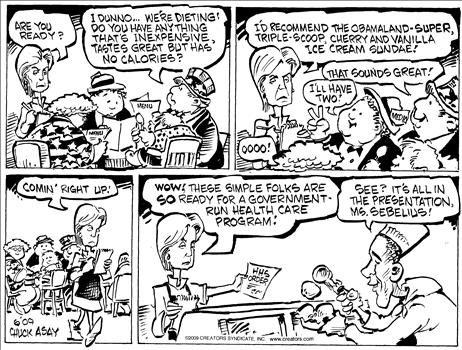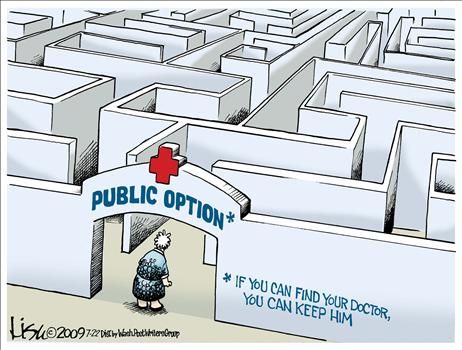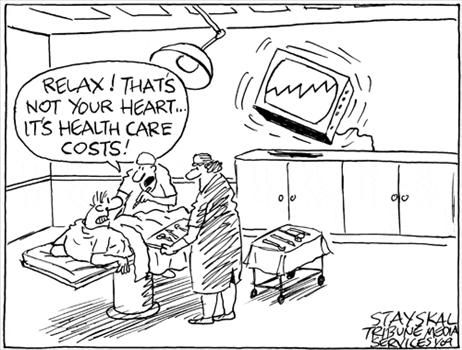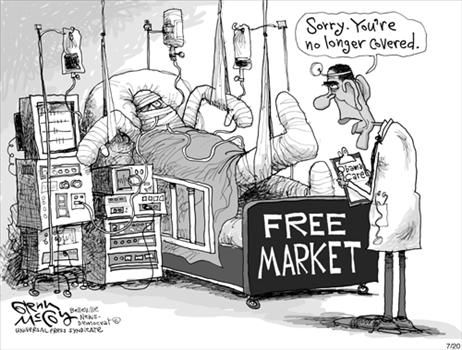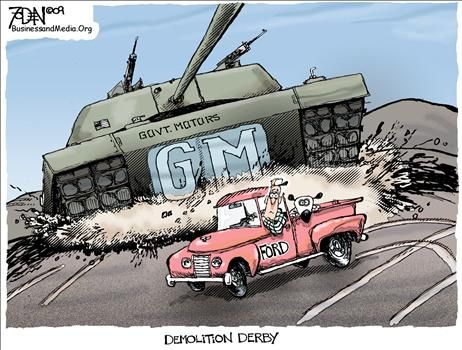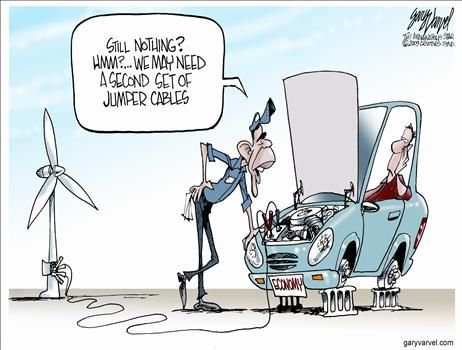Thursday, July 23, 2009
The Press Conference President Obama Could Give
Last week, the Federal Reserve made a little noticed, but astonishing announcement. In addition to projecting unemployment over 10% in the coming months, they also projected no net new jobs over the next five years.
Let me repeat that to drive the point home: no net new jobs over the next five years.
This is an amazing and sober prediction about the health of our economy, one that should make every lawmaker pause and reassess the priorities of government.
In this environment, almost every decision for lawmakers should come down to one question: Since small businesses create ¾ of the jobs in America, would this piece of legislation create a better or worse environment for small business job creation? [snip]
What if President Obama used the announcement from the Federal Reserve to, in effect, start the health-reform debate over?
What if he said, that given the continued trouble of our economy, he is asking Congress to go back to the drawing board to craft a pro-jobs, pro-growth, pro-reform health bill that would gain bipartisan support?
What would that bill look like?
[There's good answers out there, they're just being ignored because improving health care isn't the real agenda here - growing government is.
Recommended > ]
READ MORE
image toon - hcare = Oby = all about ice cream presentation
THE 2 PERCENT SOLUTION
Uninsurance is a lot like unemployment -- it happens to many people for short periods of time, but it afflicts very few people for long periods of time. In fact, of all the people who are uninsured today, less than half will be uninsured a year from now. Less than one in ten will be uninsured two years from now -- an amount equal to less than 2 percent of the nonelderly population. If Congress doesn't keep its eye on the ball (and it is inconceivable that it will keep its eye on the ball) we can end up spending $1.5 trillion over the next 10 years and -- at the end of the day -- have no assurance that the 2 percent will actually have been helped. That works out to about $325,000 for each person who may not be helped, says Goodman.
If Congress doesn't keep its eye on the ball (and it is inconceivable that it will keep its eye on the ball) we can end up spending $1.5 trillion over the next 10 years and -- at the end of the day -- have no assurance that the 2 percent will actually have been helped. That works out to about $325,000 for each person who may not be helped, says Goodman.
Who exactly are the uninsured, asks Goodman? At any given time:
- Roughly one-fourth of the uninsured are eligible for Medicaid or a State Children's Health Insurance Program (SCHIP), or have already enrolled and are erroneously counted as uninsured. If they are not otherwise getting free care, they can generally enroll at the time of treatment -- or even later!
- More than 40 percent of the uninsured live in households with annual incomes in excess of $50,000 and presumably could pay premiums (or the employee's share of premiums) -- although there is some argument about the meaning of this number.
- About one-fourth of the uninsured are immigrants, many of whom are illegal and will not be helped by health reform in any event.
(1) federal and state legislation has made it increasingly easy to get insurance after people get sick and
(2) an enormous amount of free care is delivered to people who have no insurance.
These two factors alone virtually guarantee that many people will voluntarily choose to remain uninsured so long as they are healthy.
READ MORE
image toon = hcare = Public Option maze...
Cost, Not Universal Coverage, is Top Health Care Concern for Voters
Sixty-one percent (61%) of voters nationwide say that cost is the biggest health care problem facing the nation today. The latest Rasmussen Reports national telephone survey finds that just 21% believe the lack of universal health insurance coverage is a bigger problem.
Only 10% believe the quality of care is the top concern, and two percent (2%) point to the inconvenience factor of dealing with the current medical system.
When asked about a choice between health care reform that would require changing existing health insurance coverage or no health care reform and no change from current coverage, voters oppose reform by a 54% to 32% margin.
This is consistent with other surveys released at the end of this past week show that 78% believe the passage of health care reform is likely to mean middle-class tax hikes. Also, by a 50% to 35% margin, Americans oppose the creation of a government insurance company to compete with private insurers.
READ MORE
LET CUSTOMERS CONTROL THE MONEY AND MARKET WILL CURE HEALTH CARE
[worth repeating:]
LET CUSTOMERS CONTROL THE MONEY AND MARKET WILL CURE HEALTH CARE
If we let individuals control their health care dollars, and free them to choose from a wide variety of health plans and providers, market competition will make health care better, more affordable and more secure, say experts:
- One-third of U.S. health care spending, or about 6 percent of GDP, is pure waste.
- That's more than $3,000 of waste for every $10,000 of health care spending.
- The waste comes about because Government controls half of our nation's health care dollars, and lets employers control an additional quarter.
- Congress should give Medicare enrollees a voucher, let them choose any health plan on the market, and let them keep the savings if they choose an economical plan. Medicare could even give larger vouchers to the poor and sick to ensure they could afford coverage.
- Congress needs to give consumers who purchase their own coverage the same tax break as workers with job-based coverage.
READ MORE
image toon hcare = Dr. Oby = free market no longer covered
Obama Care in 60 seconds
I saw the most effective commercial I've ever seen. The commercial, very quickly, puts forward the best argument against government-controlled health care.
POLL: 53% Now Oppose Congressional Health Care Reform
. 44% of U.S. voters are at least somewhat in favor of the reform effort while 53% are at least somewhat opposed.
44% of U.S. voters are at least somewhat in favor of the reform effort while 53% are at least somewhat opposed.
Today’s 44% level of support is down from 46% two weeks ago, and 50% in late June.
Opposition has grown from 45% in late June to 49% two weeks ago and 53% today.
As in earlier surveys, those with strong opinions are more likely to oppose the plan rather than support it. The current numbers: 24% strongly favor and 37% strongly oppose.
There is a huge partisan divide on the health care plan. Sixty-eight percent (68%) of Democrats favor it. However, the plan is opposed by 80% of Republicans and 60% of those not affiliated with either major party.
[Hence Obama's rush - the more Americans learn about socialized medicine....]
READ MORE
[But as Obama demonstrated in his 'press conference' last night, he's no intention of letting voter opinion sway his agenda - the choke point is our representatives, so...
"OPPOSE HR3200 - Government run health care "
House-Pelosi: http://speaker.house.gov/contact/
YOUR Congressman: https://forms.house.gov/wyr/welcome.shtml
or: Speed Message them with your personal distribution list...
Tossing Free Honduras under the Bus
Costa Rican President Oscar Arias is promoting a brazen "peace plan" for Honduras that is a betrayal of democracy. Former president Oscar Zelaya of Honduras, removed from office for violating the Honduran Constitution and keep himself in office, rushed to accept the so called arbitrated terms of the deal
So too did The New York Times. The "Arias Plan" and its seven points gives Zelaya all that he needs to convert Honduras into another leftist member of the Chavez-backed ALBA alliance, joining Ecuador, Bolivia, Nicaragua, , and of course Cuba in solidarity with Hugo Chavez's Venezuela.
For its part, the Micheletti government in Honduras late on Sunday rejected the Arias-Zelaya Plan and instead proposed an Independent Truth Commission to review how and what Zelaya and his actors had been doing in Honduras. Clearly, none yet have reviewed all the facts.
More to the point, we hope that this Arias-backed treaty cum force majeur to illegally deliver that which should not be delivered in Honduras will soon be reviewed by pan American scholars, legal experts, constitutional analysts and the media.
If there is anything debatable about the crisis it is the question of whether the government can defend the expulsion of the president. In fact it had good reasons for that move and they are worth Mrs. Clinton's attention -- if she is interested in defending democracy...
READ MORE
Clunker Law is a lemon
Good luck figuring out how to navigate your way through the hoops the government has imposed on Americans who hope to benefit from the cash-for-clunkers act. Michelle Singletary explains in the Washington Post. She also acknowledges,
"in truth, this is welfare for the limping auto industry." [mac x3 indent red, r2l]Beyond that, two relatives of mine have been laid off by Enterprise Rent-A-Car. They worked in the area responsible for selling cars used in the rental operations to people who want to buy them.
The company decided that they did not want to run the risk of keeping these workers when some of the car purchasing public migrates to buying government-subsidized new cars...
READ MORE
image toon - sclm auto = GM v Ford pickup demolition derby
FINANCIAL BAILOUT SUPPORT COULD REACH $23.7 TRILLION
The government's top bailout watchdog says that the total price tag for federal support stemming from the financial crisis could reach $23.7 trillion.
Neil Barofsky, the inspector general for the Troubled Asset Relief Program, in his prepared testimony to the House Oversight and Government Reform Committee, notes that the TARP -- which started as a $700 billion bailout -- has expanded well beyond that figure.
"The potential financial commitment the American taxpayers could be responsible for is of a size and scope that isn't even imaginable. If you spent a million dollars a day going back to the birth of Christ, that wouldn't even come close to just $1 trillion -- $23.7 trillion is a staggering figure." [pc blk indent-rtl bold red]
[And this before government health care.]
READ MORE
STATES HIT HARDEST BY RECESSION GET LEAST STIMULUS MONEY
.
The stimulus bill "includes help for those hardest hit by our economic crisis," President Obama promised when he signed the bill into law on Feb. 17. "As a whole, this plan will help poor and working Americans."
But an analyis of where the money's gone shows that States with higher bankruptcy, foreclosure and unemployment rates got less money than higher income states having the least problems are large:
- With a spread of almost $38,000 in per-person income between the top and bottom states, this has a sizable impact.
- High-income states get considerably more stimulus money; states with higher bankruptcy rates got a lot less, not more, money -- roughly $86 less per person for each percentage point increase in the state's bankruptcy rate.
- States with higher foreclosure rates were treated very similarly, losing $82 per person for each one percentage point more of the people suffering foreclosures.
READ MORE
image toon = mny grn = Oby's south poll stimulus truck
What Climate Change Can Do For the Left
A review of Why We Disagree About Climate Change, by Mike Hulme (Cambridge University Press, 2009)
More than a few people will be tempted to buy this book based on the promise, implicit in its title, that it offers an examination of the ideas and motives of both sides in the global warming debate. But that is not what this book is about.
Rather, it is the musings of a British socialist about how to use the global warming issue as a means of persuading "the masses" to give up their economic liberties. The fact that the author, Mike Hulme, is a scientist who helped write the influential reports of the Intergovernmental Panel on Climate Change (IPCC) and many other influential government agencies makes this book more disturbing than informative... [snip]
In his preface, Hulme frankly admits that his perspective is colored by his politics - "democratic socialist"(p. xxxiv) - and it soon becomes apparent that the only disagreements about climate change he's aware of are those occurring between the left (people who think like him) and the far left, people he describes as "eco-anarchists" (p. 268), "eco-socialists" (Ibid.), and "eco-authoritarians" (p. 309).
Opposition from centrists, conservatives, libertarians, and nonideological opposition from scientists who dispute his alarmist spin on the complicated data of global warming merit hardly any mention... [snip]
There is a debate taking place about global warming in America, and it is not the one described by Hulme as being between those who favor "cap and trade" and those who favor even more radical changes in "political, social, and economic behaviour" (p. xxvii).
Rather, it is about how much of the warming of the late twentieth century was natural and how much was man-made, whether the consequences of that warming were on balance positive or negative, and whether anything should be or could be done to prevent or delay future warming, or if in fact such warming has already abated and we're entering another cooling cycle.
This debate - the real public policy debate - is entirely missing from this book...
READ MORE
Austin's clean energy program costing more, selling less
For the past decade, Austin's ambition to become the world's clean-energy capital has been best exemplified by one effort: GreenChoice, a program that sells electricity generated entirely from renewable sources such as wind. [snip]
Electric utility chief says separate charge for renewable power may need to be rolled into ALL users' bills...
[I.e., it failed, so the government will force more people to take part in it. Inevitable]
READ MORE
CBS And NBC Tout Continued Relevance of NAACP
Marking the 100th anniversary of the NAACP on CBS’s Sunday Morning, correspondent Bill Whitaker wondered:
"A black president who addresses black issues unflinchingly... Attorney General Eric Holder dedicated to equal justice...some say begs the question, is the NAACP needed anymore? Is it even relevant? Is it time for the venerable organization to say ‘mission accomplished’?" [mac x3 indent-red - r2l red]
Later in the segment, Whitaker answered that question:
"Current NAACP President Benjamin Todd Jealous and former NAACP President Julian Bond say there’s still plenty of work to do." [same but l2r]
On NBC’s Nightly News on Wednesday, correspondent Ron Allen similarly questioned the NAACP’s relevance:
"Jealous says the battle [nothing adversarial there] now is to close the social and economic achievement [i.e., equality of outcomes] gap between people of color and mainstream America...A fight for justice and equality he insists must be carried on." [l2r then bolds + quips]Neither Whitaker nor Allen applied any liberal political labels to the NAACP or featured any critics of the organization’s left-wing causes...
READ MORE
CNN Touts Obama at the NAACP: Bush Didn't 'Have the Same Kind of Credibility' as the Black President
The vision of the first black president speaking before the NAACP clearly mesmerized liberal reporters. But their ardor began to sound racially touchy when they suggested Obama has more "credibility" than pale presidents. On Thursday Night’s Anderson Cooper 360, Cooper oozed over the president:
"He had a lot more to say in a way that no other president has ever been able to before." [mac x3, r2l red + bold]But the message itself hardly seemed any different than what President Bush would say, as Cooper summarized it:
"tremendous advances have been made in race relations in America, but there's still a lot of work to do." [l2r, red]
Cooper passed the baton to CNN reporter Suzanne Malveaux, who sounded the same touchy note:
"When we saw President Bush go before this group in 2006, a lot of tension, he ignored this group for five years or so. But his message was similar. He talked about the need for a ccountability, responsibility.
He did not have the same kind of credibility that President Obama does." [r2l, red then bolds]
Turn that around. Can you imagine anyone at CNN suggesting last year that Hillary Clinton or John McCain had "more credibility" with white audiences than Obama because of their skin color?
READ MORE
Obama’s Jedi Mind Trick: We’ve Been Put on Notice
.
That’s right. Obama’s putting everyone on notice [Re: health care shall pass]. Dare not oppose him and bet not against him. Enough of the 'chatter'.
I keep waiting for the liberal cynics to step up and be, oh, I don’t know…CYNICAL about this guy, but maybe George Lucas is right. Maybe Obama is a Jedi. Because when there is cynicism, it melts…
“Henry Waxman’s in charge of the health plan?” says the cynic, “Oh, Lord. He’s an idiot. This thing’ll never happen.”
Obama appears, waving his hand like Obi-Wan Kenobi,
“I’m putting you on notice.”
I’ve been put on notice.
"I heard a lot of chatter."
Sorry for the chatter.
"This thing will happen."
This thing will happen. Obama’s gonna change it. This thing will happen...
I’m not calling Obama the Antichrist, but in this context he is the opposite of the messiah so many seem to think him. It seems like his supporters are looking for the divine, but what they’ve got is a politician.
Some day they're going to be pissed.
[Sooner would be better than later.]
READ MORE
Taxpayers: Eat your hearts out, suckers
CALIFORNIA
A looming problem has received far too little coverage from a liberal-dominated media: the power of public pensions to destroy our nation's finances and ransack our wallets.
For many years, government workers have enjoyed munificent benefits: relatively high salaries for lenient work demands; gold-plated retirement benefits that allow most of them to "retire" at a young age with very high pensions and generous health care benefits.
All courtesy of us: the lowly taxpayer toiling away at jobs that may vanish at a moment's notice and that certainly don't guarantee the value of any retirement package, none of which is true for the ever-expanding ranks of government workers.
A recent Forbes magazine article highlights the absurd benefits that public sector workers enjoy on the job and off the job when they retire. The article, describing the leisurely life of retired government employees, could be lifted from the pages of Travel and Leisure magazine.
The poster boy for the problem? A retired 42 year old policeman lollygagging on a beach, comfortable with his $2 million pension.
But there are more tales from across our land: a fireman who can be "retired" at 55, collect a pension and still collect a salary while keeping the job he "retired" from; a thirty eight year old teacher in New Jersey earning twice the state‘s average income who works 10 months a year and barely contributes to a pension that will allow early retirement with quite the golden nest egg; California prison guards earning $300,000 a year.
In my own area, the superintendent of a small, suburban school district earns -- well, makes -- over $400,000 a year and has a slew of benefits to boot. Remember that story when teachers' unions decry low salaries.
These anecdotal stories of staggering benefits received by the government worker elites are companied by reams of statistics that display the ticking time bomb of government salaries and golden parachutes... [snip]
Their pensions are guaranteed by state law, regardless of how pension investments perform [just like our 401ks, right?], because you, the taxpayer, guarantee them with your tax dollars. It is the law, made by our legislators with the 'support' of government employee labor unions.
How bad is the problem? This "Hidden Pension Fiasco" will cost us over one trillion dollars... [snip]
Of course, the key point is the need to make our elected representatives themselves pay for the steps they have taken over the years to enrich public unions at our expense. That is the only type of payback they understand: our votes. They should not come as cheaply or carelessly as they have in the past. They have cost us too much already.
[And nowhere worse than in California. MUST READ > ]
READ MORE
Walter Cronkite, Vietnam, and the Decline of Media Credibility
Walter Cronkite’s remarks at the end of his February 27, 1968 evening news broadcast, four decades ago today, were a watershed in the history of the MSM’s credibility.
Unless you’re at least 55 years old, you probably don’t remember that CBS broadcast 40 years ago. The most trusted man in America had recently returned from Vietnam where he hosted a documentary on the VC/NVA TET (New Year) offensive that began January 31, 1968. Back in NYC, he closed his program that night by introducing “an analysis that must be speculative, personal, [and] subjective.” Among his comments were these:
Who won and who lost in the great Tet offensive against the cities? I’m not sure. The Vietcong did not win by a knockout, but neither did we. The referees of history may make it a draw.
It seems now more certain than ever that the bloody experience of Vietnam is to end in a stalemate.
But it is increasingly clear to this reporter that the only rational way out then will be to negotiate, not as victors, but as honorable people who lived up to their pledge to defend democracy, and did the best they could. (Emphases added)
Most evenings Cronkite ended his broadcasts with “And that’s the way it is.” That night he ended with a more somber, “This is Walter Cronkite. Good night.”
Today, it’s hard to fully appreciate the stature and status Cronkite held in 1968. He was the successor in fame to the demigod persona that had been Edward R. Murrow. When President Johnson heard of Cronkite’s comments, he was quoted as saying, “That’s it. If I’ve lost Cronkite, I’ve lost middle America.”
In January 2006, Cronkite said his statement on Vietnam was his proudest moment. When asked then if he would give the same advice on Iraq, Cronkite didn’t hesitate to say “Yes.”
At the time, Cronkite’s pronouncement added credibility and importance to all the network anchors. His was a stunning exercise of media power. But, in the perspective of history, the outcome of his pronouncement is not universally recognized as having been positive. He overtly and figuratively stepped out from behind the microphone to add his personal commentary to the news. We had not seen this before. By doing so, Cronkite issued an implicit license to his journalistic colleagues to interject personal opinions into their factual reporting of the news. The difference is that Cronkite clearly labeled it as personal opinion, while many MSM news personalities today weave their opinions into reporting. His sentiment registered with many, perhaps most, of his viewers that night. He changed opinions by offering his own. But in hindsight, his analysis was wrong – dead wrong for some.
Generally, the “referees of history” have not rendered the TET offensive a military draw. The VC/NVA suffered unexpectedly high casualties, from which it took years to recover. In particular, the ranks of the Viet Cong were decimated. General No Nguyen Giap, the Supreme Commander of the Viet Minh (NVA) forces said, in a 1989 interview with CBS’s Morley Safer,
“We paid a high price, but so did you…not only in lives and material…After Tet the Americans had to back down and come to the negotiating table, because the war was not only moving into…dozens of cities and towns in South Vietnam, but also to the living rooms of Americans back home for some time. The most important result of the Tet offensive was it made you de-escalate the bombing, and it brought you to the negotiation table. It was, therefore, a victory…The war was fought on many fronts. At that time the most important one was American public opinion.” (The Vietnam War: An Encyclopedia of Quotations, Howard Langer, 2005)
The Vietnam War did not end in a stalemate, particularly for those S. Vietnamese who, at risk and often loss of life, loyally supported the U.S. Armed Forces (not all did, but very many did). We left them in a lurch, cut off their military aid, and watched while they suffered the consequences when the North Vietnamese blatantly ignored the negotiated resolution (they never intended to honor) that Cronkite advocated.
Many of those of us who served in Vietnam do not look upon its ending as reflecting “honorable people who lived up to their pledge to defend democracy.” A compelling case can be made that we should never have sent troops to Vietnam in the first place. But we did. And then, after nearly 60,000 U.S. deaths and countless Vietnamese casualties, we bugged out. There’s no way to put an honorable face on that unavoidable truth.
Once upon a time, I lived for awhile not far from a village called Ba Chuc in An Giang Province in the Mekong Delta. After the U.S. evacuated Vietnam, there was nothing to stop old animosities between the Cambodians and Vietnamese from turning hot. Here’s a description of what happened in Ba Chuc.
“On April 30, 1977, Pol Pot’s troops launched a surprise attack on 13 villages in eight Vietnamese border provinces. Ba Chuc was the hardest hit. The massacre was at its fiercest during the 12 days of occupation, April 18-30, 1978, during which the intruders killed 3,157 villagers. The survivors fled and took refuge in the pagodas of Tam Buu and Phi Lai or in caves on Mount Tuong, but they were soon discovered. The raiders shot them, slit their throats or beat them to death with sticks. Babies were flung into the air and pierced with bayonets. Women were raped and left to die with stakes planted in their genitals.”
There were two survivors to the massacre.
Cronkite didn’t cover it on the CBS evening news.
As judged by subsequent events, Cronkite was wrong. And over time, his words became a watershed marking the place where the gradual erosion of the MSM’s credibility began.
READ MORE










